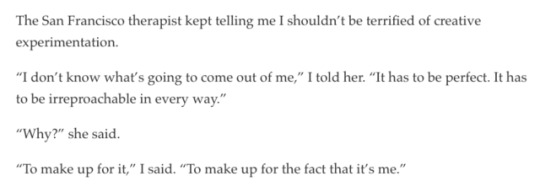Photo

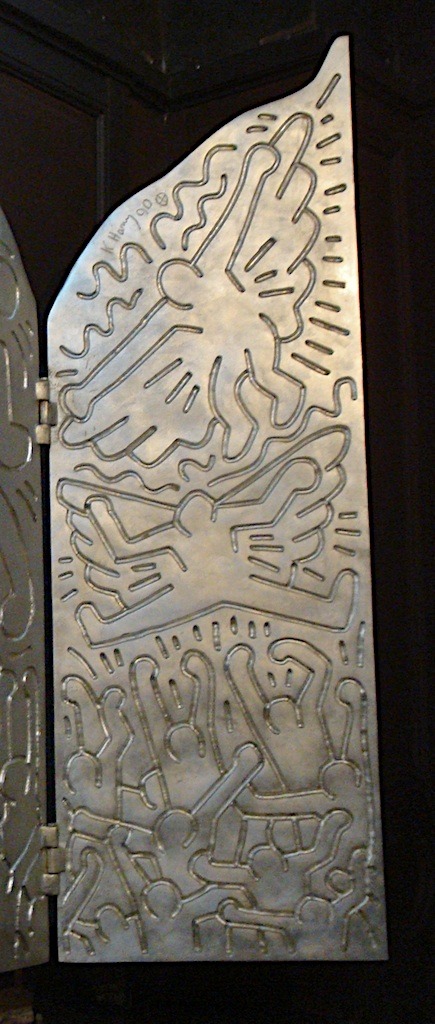

Keith Harring
Triptyque “La vie du Christ”
Église Saint-Eustache, Paris
18K notes
·
View notes
Text
always a delight to find out that a goofy person is actually also very sincere
74K notes
·
View notes
Text
missing summer already




sometimes do you ever just want to
82K notes
·
View notes
Note
got a friend in a screenwriting class with an assignment to adapt something into a show or movie. some guy they know chose house of leaves.
YOU CANT DO THAT ITS EFFECT IS CONFINED TO ITS MEDIUM ANY ATTEMPT AT ADAPTING IT TO A FILM IS FUTILE IT'LL DESTROY THE HORRORRRRRRRRRR

36 notes
·
View notes
Photo
I lived about a block from this church for a good year or so. It’s strange to see it highlighted here. This church is interesting because it has a lookout which is open on certain days. You can climb the bell tower and look out across Tübingen and the Neckar and the Schwabian Alps. The bells were the backdrop to my life in Tübingen, ringing their chaos every quarter hour. Wowowow. To think on it again

St. George’s Collegiate Church in Tübingen, Germany.
A window in St. Georges Collegiate church in Tubingen, Germany, showing a man being executed on the Catherine wheel. The window was installed by the Duke of Wuerttemberg as atonement for wrongly executing an innocent man.
1K notes
·
View notes
Text
can anyone remember that post about how children write the best poems & it had an article attached showing the differences between little kids' poetry & preteens?? im desperate to find it again
61K notes
·
View notes
Text
Someone at my part-time, you’re-in-school job forgot to schedule clients for me today, so I stayed home reading and drinking coffee with the heat low so Autumn hugs me arms-length. I’m grateful for the respite. I could do homework, but maybe I can give myself today, relaxing and writing fleeting lyrics when they strike me. I have therapy later and then I’m giving a talk at a frat house about men’s mental health. Lord knows I need the solace.
0 notes
Text
"Don't spy on a privacy lab" (and other career advice for university provosts)
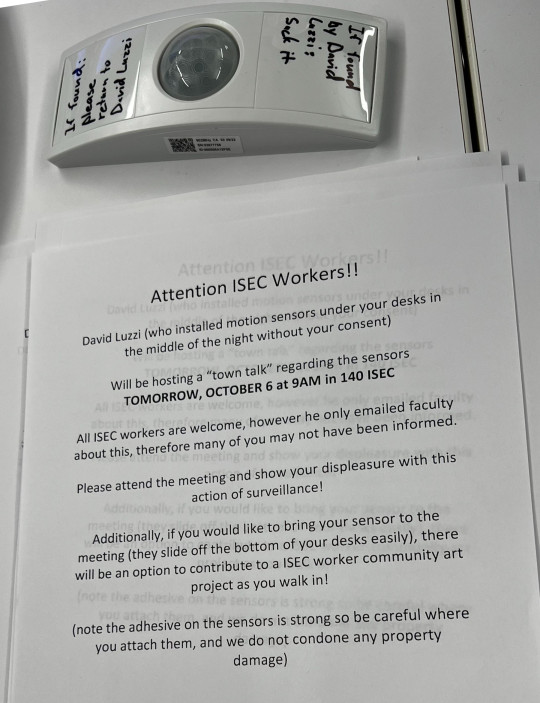
This is a wild and hopeful story: grad students at Northeastern successfully pushed back against invasive digital surveillance in their workplace, through solidarity, fearlessness, and the bright light of publicity. It’s a tale of hand-to-hand, victorious combat with the “shitty technology adoption curve.”
What’s the “shitty tech adoption curve?” It’s the process by which oppressive technologies are normalized and spread. If you want to do something awful with tech — say, spy on people with a camera 24/7 — you need to start with the people who have the least social capital, the people whose objections are easily silenced or overridden.
That’s why all our worst technologies are first imposed on refugees -> prisoners -> kids -> mental patients -> poor people, etc. Then, these technologies climb the privilege gradient: blue collar workers -> white collar workers -> everyone. Following this pathway lets shitty tech peddlers knock the rough edges off their wares, inuring us all to their shock and offense.
https://pluralistic.net/2022/08/21/great-taylors-ghost/#solidarity-or-bust
20 years ago, if you ate dinner under the unblinking eye of a CCTV, it was because you were housed in a supermax prison. Today, it’s because you were unwise enough to pay hundreds or thousands of dollars for “home automation” from Google, Apple, Amazon or another “luxury surveillance” vendor.
Northeastern’s Interdisciplinary Science and Engineering Complex (ISEC) is home to the “Cybersecurity and Privacy Institute,” where grad students study the harms of surveillance and the means by which they may be reversed. If there’s one group of people who are prepared to stand athwart the shitty tech adoption curve, it is the CPI grad students.
Which makes it genuinely baffling that Northeastern’s Senior Vice Provost for Research decided to install under-desk heat sensors throughout ISEC, overnight, without notice or consultation. The provost signed the paperwork that brought the privacy institute into being.
Students throughout ISEC were alarmed by this move, but especially students on the sixth floor, home to the Privacy Institute. When they demanded an explanation, they were told that the university was conducting a study on “desk usage.” This rang hollow: students at the Privacy Institute have assigned desks, and they badge into each room when they enter it.
As Privacy Institute PhD candidate Max von Hippel wrote, “Reader, we have assigned desks, and we use a key-card to get into the room, so, they already know how and when we use our desks.”
https://twitter.com/maxvonhippel/status/1578048837746204672
So why was the university suddenly so interested in gathering fine-grained data on desk usage? I asked von Hippel and he told me: “They are proposing that grad students share desks, taking turns with a scheduling web-app, so administrators can take over some of the space currently used by grad students. Because as you know, research always works best when you have to schedule your thinking time.”
That’s von Hippel’s theory, and I’m going to go with it, because the provost didn’t offer a better one in the flurry of memos and “listening sessions” that took place after the ISEC students arrived at work one morning to discover sensors under their desks.
This is documented in often hilarious detail in von Hippel’s thread on the scandal, in which the university administrators commit a series of unforced errors and the grad students run circles around them, in a comedy of errors straight out of “Animal House.”
https://twitter.com/maxvonhippel/status/1578048652215431168
After the sensors were discovered, the students wrote to the administrators demanding their removal, on the grounds that there was no scientific purpose for them, that they intimidated students, that they were unnecessary, and that the university had failed to follow its own rules and ask the Institutional Review Board (IRB) to review the move as a human-subjects experiment.
The letter was delivered to the provost, who offered “an impromptu listening session” in which he alienated students by saying that if they trusted the university to “give” them a degree, they should trust it to surveil them. The students bristled at this characterization, noting that students deliver research (and grant money) to “make it tick.”
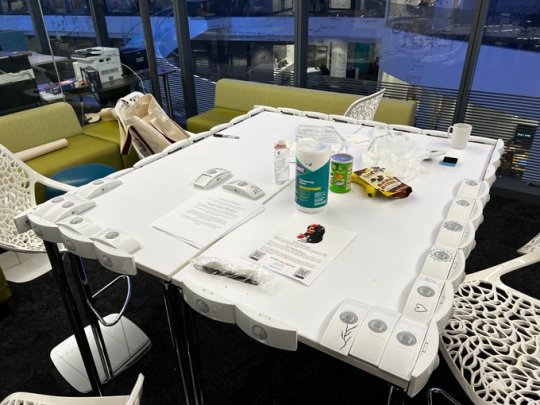
[Image ID: Sensors arrayed around a kitchen table at ISEC]
The students, believing the provost was not taking them seriously, unilaterally removed all the sensors, and stuck them to their kitchen table, annotating and decorating them with Sharpie. This prompted a second, scheduled “listening session” with the provost, but this session, while open to all students, was only announced to their professors (“Beware of the leopard”).
The students got wind of this, printed up fliers and made sure everyone knew about it. The meeting was packed. The provost explained to students that he didn’t need IRB approval for his sensors because they weren’t “monitoring people.” A student countered, what was being monitored, “if not people?” The provost replied that he was monitoring “heat sources.”
https://github.com/maxvonhippel/isec-sensors-scandal/blob/main/Oct_6_2022_Luzzi_town_hall.pdf
Remember, these are grad students. They asked the obvious question: which heat sources are under desks, if not humans (von Hippel: “rats or kangaroos?”). The provost fumbled for a while (“a service animal or something”) before admitting, “I guess, yeah, it’s a human.”
Having yielded the point, the provost pivoted, insisting that there was no privacy interest in the data, because “no individual data goes back to the server.” But these aren’t just grad students — they’re grad students who specialize in digital privacy. Few people on earth are better equipped to understand re-identification and de-aggregation attacks.

[Image ID: A window with a phrase written in marker, ‘We are not doing science here’ -Luzzi.]
A student told the provost, “This doesn’t matter. You are monitoring us, and collecting data for science.” The provost shot back, “we are not doing science here.” This ill-considered remark turned into an on-campus meme. I’m sure it was just blurted in the heat of the moment, but wow, was that the wrong thing to tell a bunch of angry scientists.
From the transcript, it’s clear that this is where the provost lost the crowd. He accused the students of “feeling emotion” and explaining that the data would be used for “different kinds of research. We want to see how students move around the lab.”
Now, as it happens, ISEC has an IoT lab where they take these kinds of measurements. When they do those experiments, students are required to go through IRB, get informed consent, all the stuff that the provost had bypassed. When this is pointed out, the provost says that they had been given an IRB waiver by the university’s Human Research Protection Program (HRPP).
Now a prof gets in on the action, asking, pointedly: “Is the only reason it doesn’t fall under IRB is that the data will not be published?” A student followed up by asking how the university could justify blowing $50,000 on surveillance gear when that money would have paid for a whole grad student stipend with money left over.
The provost’s answers veer into the surreal here. He points out that if he had to hire someone to monitor the students’ use of their desks, it would cost more than $50k, implying that the bill for the sensors represents a cost-savings. A student replies with the obvious rejoinder — just don’t monitor desk usage, then.
Finally, the provost started to hint at the underlying rationale for the sensors, discussing the cost of the facility to the university and dangling the possibility of improving utilization of “research assets.” A student replies, “If you want to understand how research is done, don’t piss off everyone in this building.”
Now that they have at least a vague explanation for what research question the provost is trying to answer, the students tear into his study design, explaining why he won’t learn what he’s hoping to learn. It’s really quite a good experimental design critique — these are good students! Within a few volleys, they’re pointing out how these sensors could be used to stalk researchers and put them in physical danger.
The provost turns the session over to an outside expert via a buggy Zoom connection that didn’t work. Finally, a student asks whether it’s possible that this meeting could lead to them having a desk without a sensor under it. The provost points out that their desk currently doesn’t have a sensor (remember, the students ripped them out). The student says, “I assume you’ll put one back.”
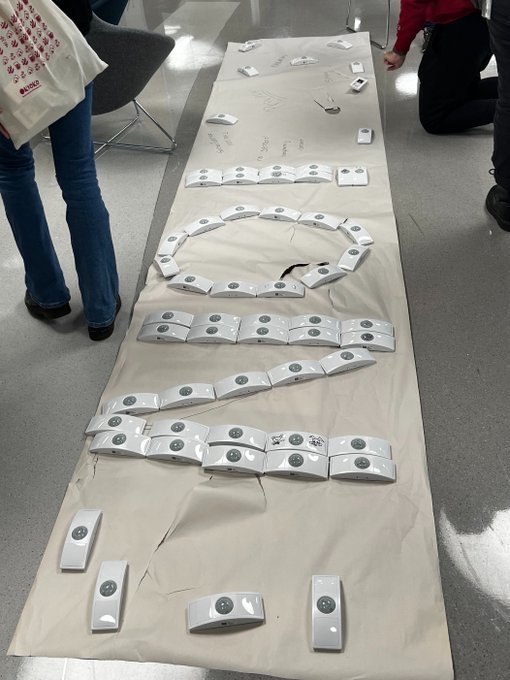
[Image ID: A ‘public art piece’ in the ISEC lobby — a table covered in sensors spelling out ‘NO!,’ surrounded by Sharpie annotations decrying the program.]
They run out of time and the meeting breaks up. Following this, the students arrange the sensors into a “public art piece” in the lobby — a table covered in sensors spelling out “NO!,” surrounded by Sharpie annotations decrying the program.
Meanwhile, students are still furious. It’s not just that the sensors are invasive, nor that they are scientifically incoherent, nor that they cost more than a year’s salary — they also emit lots of RF noise that interferes with the students’ own research. The discussion spills onto Reddit:
https://www.reddit.com/r/NEU/comments/xx7d7p/northeastern_graduate_students_privacy_is_being/
Yesterday, the provost capitulated, circulating a memo saying they would pull “all the desk occupancy sensors from the building,” due to “concerns voiced by a population of graduate students.”
https://twitter.com/maxvonhippel/status/1578101964960776192
The shitty technology adoption curve is relentless, but you can’t skip a step! Jumping straight to grad students (in a privacy lab) without first normalizing them by sticking them on the desks of poor kids in underfunded schools (perhaps after first laying off a computer science teacher to free up the budget!) was a huge tactical error.
A more tactically sound version of this is currently unfolding at CMU Computer Science, where grad students have found their offices bugged with sensors that detect movement and collect sound:
https://twitter.com/davidthewid/status/1387909329710366721
The CMU administration has wisely blamed the presence of these devices on the need to discipline low-waged cleaning staff by checking whether they’re really vacuuming the offices.
https://twitter.com/davidthewid/status/1387426812972646403
While it’s easier to put cleaners under digital surveillance than computer scientists, trying to do both at once is definitely a boss-level challenge. You might run into a scholar like David Gray Widder, who, observing that “this seems like algorithmic management of lowly paid employees to me,” unplugged the sensor in his office.
https://twitter.com/davidthewid/status/1387909329710366721
This is the kind of full-stack Luddism this present moment needs. These researchers aren’t opposed to sensors — they’re challenging the social relations of sensors, who gets sensed and who does the sensing.
https://locusmag.com/2022/01/cory-doctorow-science-fiction-is-a-luddite-literature/
[Image ID: A flier inviting ISEC grad students to attend an unadvertised ‘listening session’ with the vice-provost. It is surmounted with a sensor that has been removed from beneath a desk and annotated in Sharpie to read: ‘If found by David Luzzi suck it.’]
41K notes
·
View notes
Text
Don’t believe anything shitty your brain tells you after dark. You are not your thoughts. You’re tired and your brain has less energy to tell the dumb thoughts to shut the fuck up.
4 notes
·
View notes
Text
On a hike through the woods today the sun shone and my legs ached in a this is living way and I crossed paths with the parents of a long-term girlfriend from high school. Her mother had the brim of her hat down low while she spoke and didn’t see me but her dad and I locked eyes and he looked at me with a furrowed-brow scrunched expression that emoted either confusion at struggling to recognize me or a jolt of memory of my unfortunate and emotionally-difficult-for-all-involved break-up with his daughter. We all kept walking our own ways and the air smelled so sweet I wish I could put it in my coffee.
2 notes
·
View notes
Photo


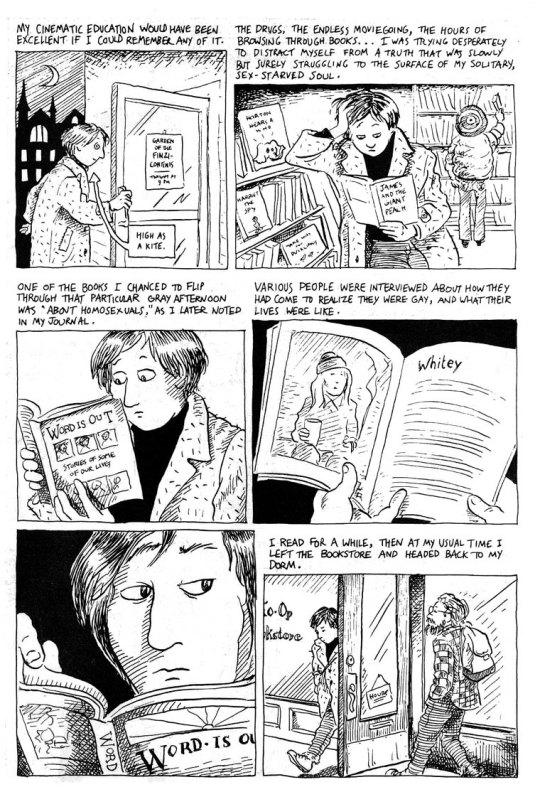


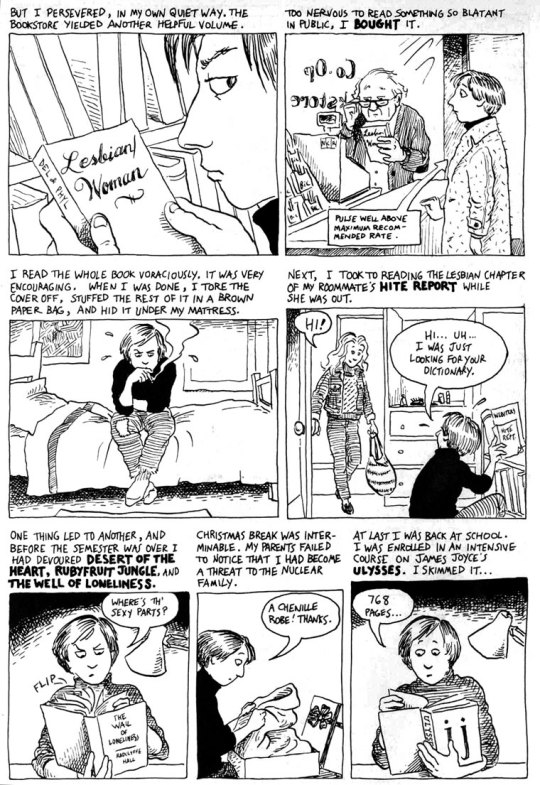
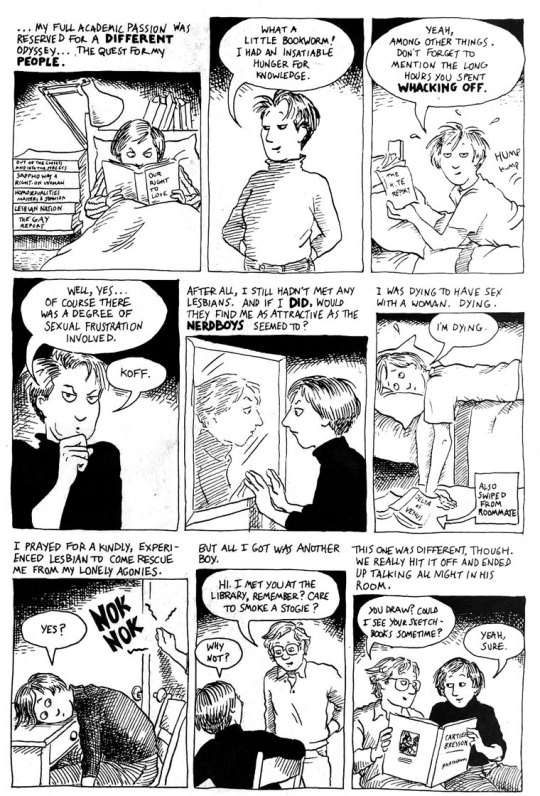



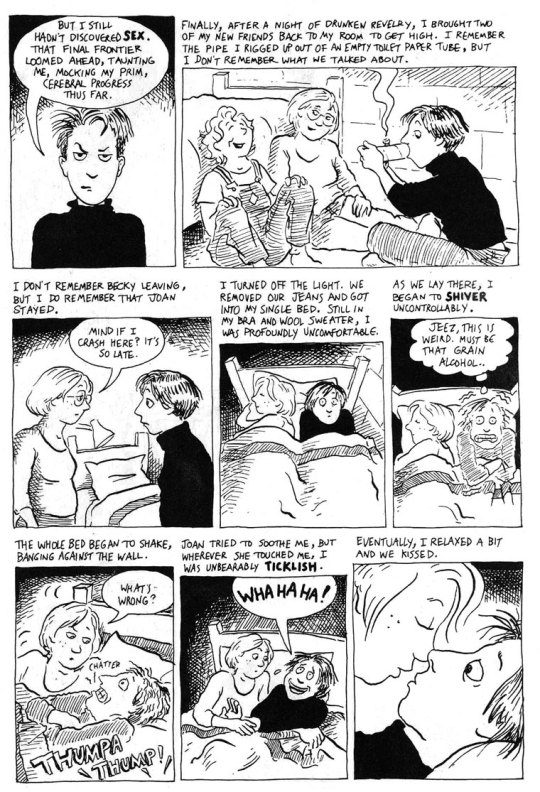

This is Alison Bechdel’s coming out story as featured on the Oberlin College website.
41K notes
·
View notes










